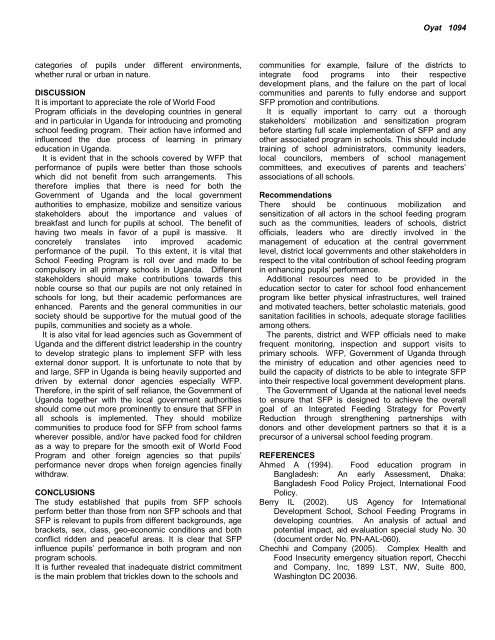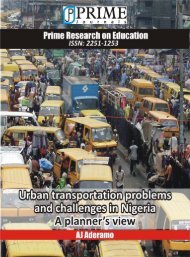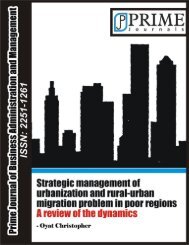You also want an ePaper? Increase the reach of your titles
YUMPU automatically turns print PDFs into web optimized ePapers that Google loves.
<strong>Oyat</strong> 1094categories of pupils under different environments,whether rural or urban in nature.DISCUSSIONIt is important to appreciate the role of World FoodProgram officials in the developing countries in generaland in particular in Uganda for introducing and promotingschool feeding program. Their action have informed andinfluenced the due process of learning in primaryeducation in Uganda.It is evident that in the schools covered by WFP thatperformance of pupils were better than those schoolswhich did not benefit from such arrangements. Thistherefore implies that there is need for both theGovernment of Uganda and the local governmentauthorities to emphasize, mobilize and sensitize variousstakeholders about the importance and values ofbreakfast and lunch for pupils at school. The benefit ofhaving two meals in favor of a pupil is massive. Itconcretely translates into improved academicperformance of the pupil. To this extent, it is vital thatSchool Feeding Program is roll over and made to becompulsory in all primary schools in Uganda. Differentstakeholders should make contributions towards thisnoble course so that our pupils are not only retained inschools for long, but their academic performances areenhanced. Parents and the general communities in oursociety should be supportive for the mutual good of thepupils, communities and society as a whole.It is also vital for lead agencies such as Government ofUganda and the different district leadership in the countryto develop strategic plans to implement SFP with lessexternal donor support. It is unfortunate to note that byand large, SFP in Uganda is being heavily supported anddriven by external donor agencies especially WFP.Therefore, in the spirit of self reliance, the Government ofUganda together with the local government authoritiesshould come out more prominently to ensure that SFP inall schools is implemented. They should mobilizecommunities to produce food for SFP from school farmswherever possible, and/or have packed food for childrenas a way to prepare for the smooth exit of World FoodProgram and other foreign agencies so that pupils’performance never drops when foreign agencies finallywithdraw.CONCLUSIONSThe study established that pupils from SFP schoolsperform better than those from non SFP schools and thatSFP is relevant to pupils from different backgrounds, agebrackets, sex, class, geo-economic conditions and bothconflict ridden and peaceful areas. It is clear that SFPinfluence pupils’ performance in both program and nonprogram schools.It is further revealed that inadequate district commitmentis the main problem that trickles down to the schools andcommunities for example, failure of the districts tointegrate food programs into their respectivedevelopment plans, and the failure on the part of localcommunities and parents to fully endorse and supportSFP promotion and contributions.It is equally important to carry out a thoroughstakeholders’ mobilization and sensitization programbefore starting full scale implementation of SFP and anyother associated program in schools. This should includetraining of school administrators, community leaders,local councilors, members of school managementcommittees, and executives of parents and teachers’associations of all schools.RecommendationsThere should be continuous mobilization andsensitization of all actors in the school feeding programsuch as the communities, leaders of schools, districtofficials, leaders who are directly involved in themanagement of education at the central governmentlevel, district local governments and other stakeholders inrespect to the vital contribution of school feeding programin enhancing pupils’ performance.Additional resources need to be provided in theeducation sector to cater for school food enhancementprogram like better physical infrastructures, well trainedand motivated teachers, better scholastic materials, goodsanitation facilities in schools, adequate storage facilitiesamong others.The parents, district and WFP officials need to makefrequent monitoring, inspection and support visits toprimary schools. WFP, Government of Uganda throughthe ministry of education and other agencies need tobuild the capacity of districts to be able to integrate SFPinto their respective local government development plans.The Government of Uganda at the national level needsto ensure that SFP is designed to achieve the overallgoal of an Integrated Feeding Strategy for PovertyReduction through strengthening partnerships withdonors and other development partners so that it is aprecursor of a universal school feeding program.REFERENCESAhmed A (1994). Food education program inBangladesh: An early Assessment, Dhaka:Bangladesh Food Policy Project, International FoodPolicy.Berry IL (2002). US Agency for InternationalDevelopment School, School Feeding Programs indeveloping countries. An analysis of actual andpotential impact, aid evaluation special study No. 30(document order No. PN-AAL-060).Chechhi and Company (2005). Complex Health andFood Insecurity emergency situation report, Checchiand Company, Inc, 1899 LST, NW, Suite 800,Washington DC 20036.




![See Full Article [pdf] - prime journals limited](https://img.yumpu.com/49292987/1/190x245/see-full-article-pdf-prime-journals-limited.jpg?quality=85)



![See Full Article [pdf] - Prime Journals](https://img.yumpu.com/44526114/1/190x245/see-full-article-pdf-prime-journals.jpg?quality=85)


![See Full Article [pdf] - prime journals limited](https://img.yumpu.com/42270022/1/190x245/see-full-article-pdf-prime-journals-limited.jpg?quality=85)

![See Full Article [pdf] - Prime Journals](https://img.yumpu.com/41607332/1/190x245/see-full-article-pdf-prime-journals.jpg?quality=85)
![See Full Article [pdf] - Prime Journals](https://img.yumpu.com/41231982/1/190x245/see-full-article-pdf-prime-journals.jpg?quality=85)

